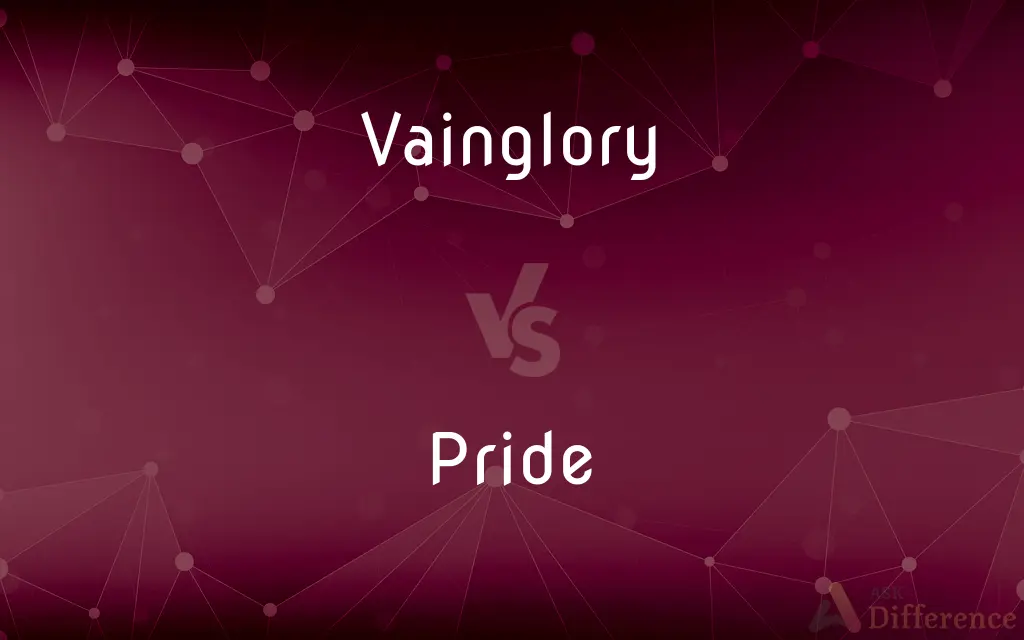Vainglory vs. Pride — What's the Difference?
By Maham Liaqat & Fiza Rafique — Updated on March 20, 2024
Vainglory is excessive and unwarranted pride in one's achievements, often with a desire for public recognition, whereas pride is a sense of self-respect and personal worth.

Difference Between Vainglory and Pride
Table of Contents
ADVERTISEMENT
Key Differences
Vainglory, derived from the Latin 'vanagloria', means excessive vanity especially in one's achievements and often involves a craving for public acknowledgment or admiration. Pride, on the other hand, is a more nuanced emotion or trait that can be positive or negative depending on its basis and expression.
While vainglory is characterized by an overt display of one's achievements for the sake of external validation, pride does not necessarily seek public recognition. Instead, pride can be a quiet satisfaction in one's abilities and accomplishments, driven by personal standards rather than the opinions of others. Vainglory is often criticized for being shallow and self-centered, while healthy pride is considered essential for self-esteem and psychological well-being.
The distinction between vainglory and pride can be seen in their impact on behavior and relationships. Vainglory can lead to arrogance, alienation, and an overemphasis on superficial achievements, potentially damaging relationships and undermining genuine self-improvement. Pride, particularly when it is healthy and well-founded, encourages personal growth, resilience, and positive social interactions.
Both vainglory and pride play significant roles in human motivation and social dynamics, but they differ fundamentally in their sources and expressions. Understanding the difference can help individuals navigate their feelings of self-worth and their interactions with others, promoting more authentic and fulfilling personal and social lives.
Comparison Chart
Definition
Excessive vanity in one's achievements, seeking public recognition
Sense of self-respect and personal worth, not necessarily public
ADVERTISEMENT
Basis
External validation and acclaim
Internal satisfaction and self-respect
Expression
Boasting and ostentation
Confidence and self-assurance
Perception
Often viewed negatively as superficial
Can be positive, reflecting genuine accomplishment
Impact
Can lead to arrogance and alienation
Promotes resilience and personal growth
Compare with Definitions
Vainglory
It involves a strong desire for public recognition and applause.
Posting achievements on social media to garner likes.
Pride
Based on real achievements and personal integrity.
Earning a degree through hard work.
Vainglory
It is generally considered a negative trait, associated with arrogance.
Being disliked for constant self-promotion.
Pride
Essential for healthy self-esteem and confidence.
Pride in one's cultural heritage.
Vainglory
Vainglory focuses on surface-level achievements rather than deeper values.
Emphasizing titles over genuine contributions.
Pride
Pride is a feeling of self-respect and personal worth.
Taking pride in one's honest work.
Vainglory
Vainglory is characterized by an excessive pride in oneself, especially for superficial achievements.
Flaunting one's wealth or status for admiration.
Pride
Involves satisfaction derived from one's own standards and values.
Feeling proud after helping someone in need.
Vainglory
Can harm relationships through its emphasis on self over others.
Ignoring friends' achievements while boasting about one's own.
Pride
Can be a positive force, motivating personal growth.
Pride in personal accomplishments inspiring others.
Vainglory
Excessive or unwarranted pride in one's accomplishments or qualities.
Pride
Pride is positive emotional response or attitude to something with an intimate connection to oneself, due to its perceived value. Oxford defines it amongst other things as "the quality of having an excessively high opinion of oneself or one's own importance" This may be related to one's own abilities or achievements, positive characteristics of friends or family, or one's country.
Vainglory
Vain, ostentatious display
"a narcissistic chaser of vainglory" (Jonathan Miles).
Pride
A sense of one's own proper dignity or value; self-respect.
Vainglory
Excessive vanity.
Pride
Pleasure or satisfaction taken in an achievement, possession, or association
Parental pride.
Vainglory
Boastful, unwarranted pride in one's accomplishments or qualities.
Pride
Arrogant or disdainful conduct or treatment; haughtiness.
Vainglory
Vain, ostentatious display.
Pride
A cause or source of pleasure or satisfaction; the best of a group or class
These soldiers were their country's pride.
Vainglory
A regarding of oneself with undue favor.
Pride
The most successful or thriving condition; prime
The pride of youth.
Vainglory
(intransitive) To boast; to act in a vain manner.
Pride
An excessively high opinion of oneself; conceit.
Vainglory
Excessive vanity excited by one's own performances; empty pride; undue elation of mind; vain show; boastfulness.
He had nothing of vainglory.
The man's undone forever; for if Hector break not his neck i' the combat, he'll break't himself in vainglory.
Pride
Mettle or spirit in horses.
Vainglory
Outspoken conceit
Pride
A flamboyant or impressive group
A pride of acrobats.
Pride
To indulge (oneself) in a feeling of pleasure or satisfaction
I pride myself on this beautiful garden.
Pride
The quality or state of being proud; an unreasonable overestimation of one's own superiority in terms of talents, looks, wealth, importance etc., which manifests itself in lofty airs, distance, reserve and often contempt of others.
Pride
A sense of one's own worth, and scorn for what is beneath or unworthy of oneself; lofty self-respect; noble self-esteem; elevation of character; dignified bearing; rejection of shame
He took pride in his work.
He had pride of ownership in his department.
Pride
Proud or disdainful behavior or treatment; insolence or arrogance of demeanor; haughty bearing and conduct; insolent exultation.
Pride
That of which one is proud; that which excites boasting or self-congratulation; the occasion or ground of self-esteem, or of arrogant and presumptuous confidence, as beauty, ornament, noble character, children, etc.
Pride
Show; ostentation; glory.
Pride
Highest pitch; elevation reached; loftiness; prime; glory.
Pride
Consciousness of power; fullness of animal spirits; mettle; wantonness.
Pride
(zoology) The small European lamprey species Petromyzon branchialis.
Pride
(reflexive) To take or experience pride in something; to be proud of it.
I pride myself on being a good judge of character.
Pride
A small European lamprey (Petromyzon branchialis); - called also prid, and sandpiper.
Pride
The quality or state of being proud; inordinate self-esteem; an unreasonable conceit of one's own superiority in talents, beauty, wealth, rank, etc., which manifests itself in lofty airs, distance, reserve, and often in contempt of others.
Those that walk in pride he is able to abase.
Pride that dines on vanity sups on contempt.
Pride
A sense of one's own worth, and abhorrence of what is beneath or unworthy of one; lofty self-respect; noble self-esteem; elevation of character; dignified bearing; proud delight; - in a good sense.
Thus to relieve the wretched was his pride.
A people which takes no pride in the noble achievements of remote ancestors will never achieve anything worthy to be remembered with pride by remote descendants.
Pride
Proud or disdainful behavior or treatment; insolence or arrogance of demeanor; haughty bearing and conduct; insolent exultation; disdain.
Let not the foot of pride come against me.
That hardly we escaped the pride of France.
Pride
That of which one is proud; that which excites boasting or self-gratulation; the occasion or ground of self-esteem, or of arrogant and presumptuous confidence, as beauty, ornament, noble character, children, etc.
Lofty trees yclad with summer's pride.
I will cut off the pride of the Philistines.
A bold peasantry, their country's pride.
Pride
Show; ostentation; glory.
Pride, pomp, and circumstance of glorious war.
Pride
Highest pitch; elevation reached; loftiness; prime; glory; as, to be in the pride of one's life.
A falcon, towering in her pride of place.
Pride
To indulge in pride, or self-esteem; to rate highly; to plume; - used reflexively.
Pluming and priding himself in all his services.
Pride
To be proud; to glory.
Pride
A feeling of self-respect and personal worth
Pride
Satisfaction with your (or another's) achievements;
He takes pride in his son's success
Pride
The trait of being spurred on by a dislike of falling below your standards
Pride
A group of lions
Pride
Be proud of;
He prides himself on making it into law school
Common Curiosities
Why is vainglory considered a vice?
Because it focuses on shallow acclaim rather than genuine merit, leading to arrogance and superficial relationships.
Can pride be a positive emotion?
Yes, when based on genuine achievements and integrity, pride is positive and essential for psychological well-being.
What is the key difference between vainglory and pride?
Vainglory seeks external validation for superficial achievements, while pride is based on genuine self-respect and merit.
Is it possible to have pride without arrogance?
Absolutely, healthy pride is based on self-respect and achievements without demeaning others or seeking superiority.
Can vainglory be constructive in any way?
While it may motivate achievement, its focus on external validation over intrinsic value limits its constructive potential.
Can pride lead to complacency?
If not balanced with humility and ongoing self-improvement, pride can become complacency.
How do cultural perceptions of pride and vainglory differ?
Cultural attitudes can vary, but many cultures value genuine pride and view vainglory with skepticism due to its superficial nature.
Can vainglory affect one's career?
Yes, while it may initially attract attention, vainglory can ultimately hinder genuine professional relationships and growth.
How does vainglory affect one's social interactions?
It can lead to alienation and damaged relationships due to its emphasis on self-promotion over genuine connections.
How can one distinguish between healthy pride and vainglory in oneself?
By examining the motivations behind one's feelings—whether they stem from genuine self-respect or a desire for external validation.
Is vainglory always obvious to others?
Not always, as some may disguise vainglory under false modesty or strategic self-promotion.
Does social media promote vainglory?
Social media can amplify vainglory by focusing on likes and followers as measures of success.
How can one develop healthy pride?
By setting personal standards, achieving goals through hard work, and valuing genuine self-improvement over external acclaim.
Is pride essential for leadership?
Healthy pride can inspire confidence and motivation, making it a valuable trait for effective leadership.
What role does humility play in pride?
Humility tempers pride, ensuring it remains grounded in genuine achievements and open to growth.
Share Your Discovery

Previous Comparison
Workshop vs. Atelier
Next Comparison
Unspoiled vs. UnspoiltAuthor Spotlight
Written by
Maham LiaqatCo-written by
Fiza RafiqueFiza Rafique is a skilled content writer at AskDifference.com, where she meticulously refines and enhances written pieces. Drawing from her vast editorial expertise, Fiza ensures clarity, accuracy, and precision in every article. Passionate about language, she continually seeks to elevate the quality of content for readers worldwide.















































